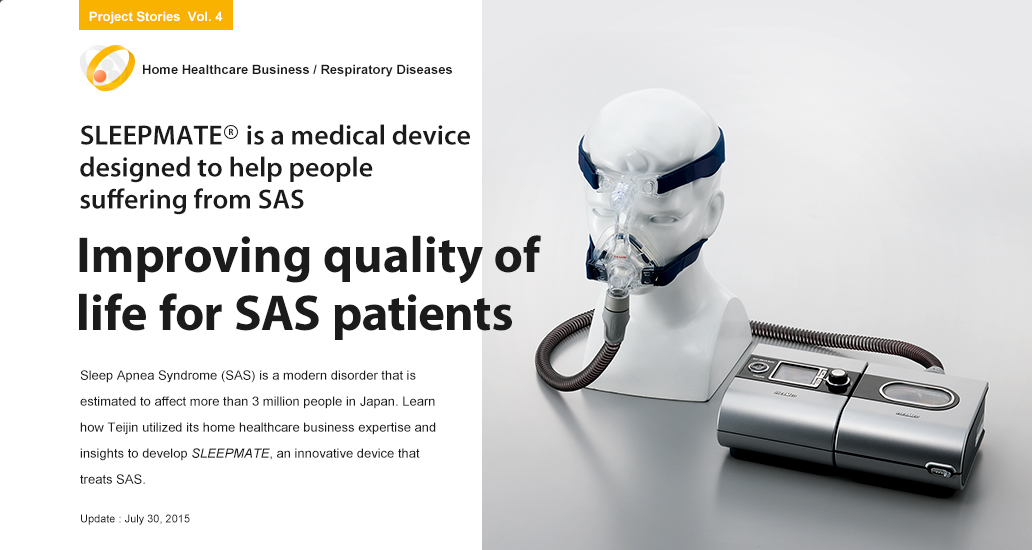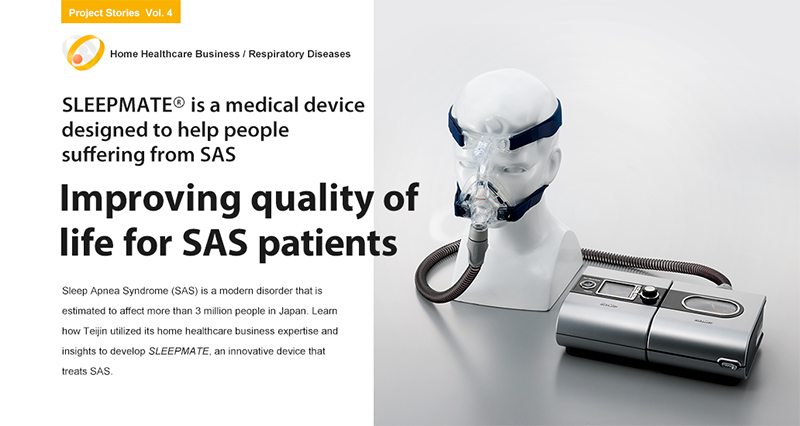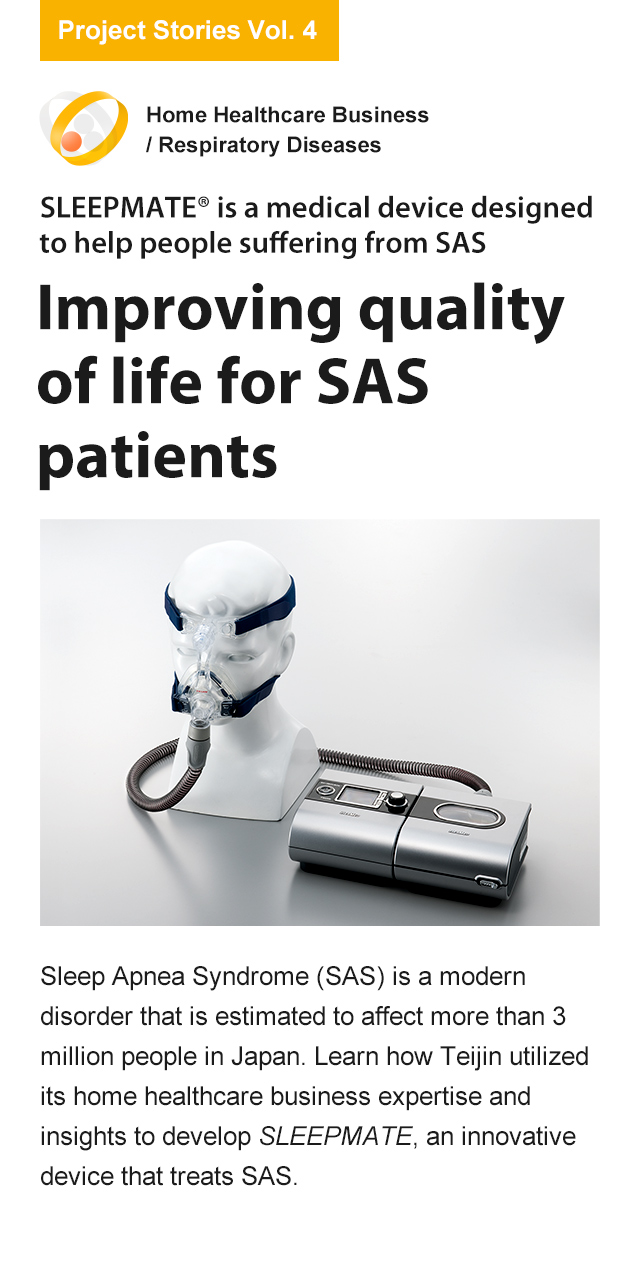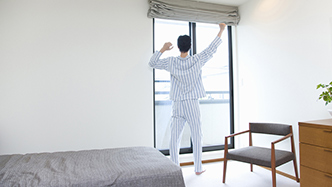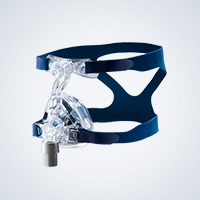Sleep Apnea Syndrome (SAS) is a disorder that causes the body to stop breathing during sleep. A person is diagnosed with SAS when breathing stops for 10 seconds or more at least 30 times a night, or at least five times per hour of sleep. Excessive fatty deposits around the tongue and neck and tonsillar hypertrophy (enlarged tonsil tissue) are considered to be the major causes of SAS because they narrow the airway in the throat. SAS may also be caused by the brain failing to send breathing signals during sleep.
Regardless of the cause, SAS causes sleep deprivation, which can put strain on the body and lead to a variety of risks. This includes negative effects on daily life due to daytime drowsiness and impaired judgment. SAS may also lead to so-called lifestyle diseases (heart disease, stroke and diabetes). Moreover, SAS is thought to have caused a significant number of accidental deaths and injuries. Approximately 3% of the population of Japan (about 3 million people) are thought to be SAS patients who do not know they have SAS and who have not received the appropriate diagnosis or treatment.

While the use of a mouthpiece or surgery are sometimes used to treat SAS, Continuous Positive Airway Pressure (CPAP) therapy is the most commonly used treatment in Europe, the US and Japan. The CPAP device blows air into the airways of a patient via a mask fitted over the nose, thus opening the airways.
In 1995, Teijin Pharma began a rental business to rent its SLEEPMATE CPAP device to medical institutions. Teijin Pharma currently holds the top market share of the CPAP device rental market in Japan.
The SLEEPMATE device has been modified to make it more compact and lightweight, and it can be carried easily outside the home. It is also equipped with features that make SAS treatment more comfortable for the patient, including a function that detects the type of apnea and applies the appropriate pressure, a humidity adjustment function and quiet operation.
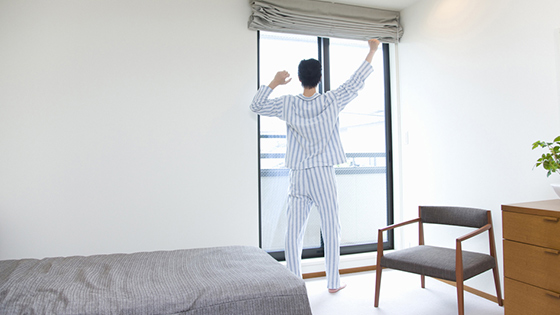
SAS is currently a recognized medical condition in Japan, and is covered by national health insurance. However, SAS was not widely known to the general public in Japan until February 2003. At that time, it was revealed that a driver of the bullet train had fallen asleep on the job, and the train traveled unattended for approximately 26 km during the eight minutes he was asleep. Through this incident, SAS came to be recognized as a potential cause of traffic and workplace accidents.
In 1990, more than 10 years before the bullet train incident, Teijin Pharma surveyed home healthcare in the US and learned about the high number of undiagnosed SAS patients, which suggested future need for SAS treatment. Interested in treatment options for SAS, Teijin Pharma contacted the Australian company ResMed Inc., where the inventor of the CPAP device, Prof. Colin Sullivan of the University of Sydney, was serving as an advisor.
Shortly after this, in 1994, five Japanese universities (including Kyoto University and Hokkaido University) established a CPAP study group to conduct multi-institutional clinical research. The research results indicated that CPAP therapy was effective in treating SAS. Encouraged by these results, Teijin Pharma launched SLEEPMATE, the first generation CPAP device from ResMed, in 1995.
In April 1998, CPAP therapy was finally approved for national health insurance coverage in Japan based on the results of the clinical research. As a result, CPAP therapy became an affordable treatment option for Japanese people, and is now the most common treatment for patients suffering from SAS in Japan.
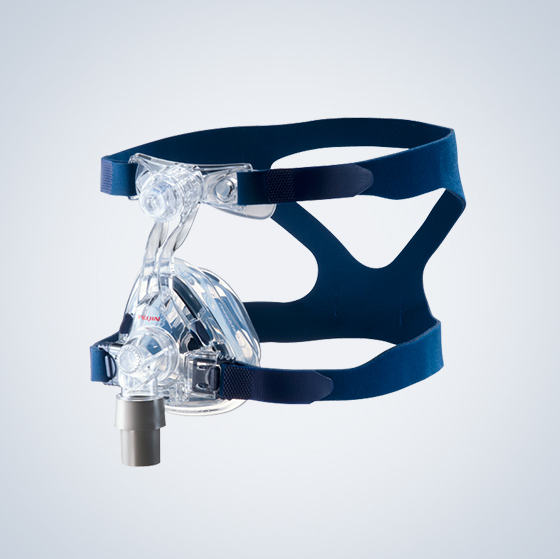 A new mask specialized for Japanese patients, which provides a better fit and quiet operation
A new mask specialized for Japanese patients, which provides a better fit and quiet operationDespite increasing awareness of SAS in Japan, Teijin Pharma still faced a number of obstacles in developing the CPAP therapy market in Japan. To begin with, although the number of people who wished to be tested for SAS was increasing, there were very few specialized medical institutions that could conduct overnight sleep tests, so patients had few opportunities to be tested. To solve this issue, Teijin Pharma offered support to medical institutions to set up facilities for the sleep test.
Another issue was that the devices and masks from ResMed Inc. did not fit Japanese patients. Therefore, Teijin negotiated with ResMed to modify the CPAP device and mask to meet the shape and size of Japanese users.
Teijin Pharma recently developed a new medical care support system called NemLink which is capable of monitoring the operational and treatment status of CPAP devices via a mobile phone network, so that doctors can monitor patients from their medical facilities. NemLink is the first original Teijin system for patients. Furthermore, Teijin provides after-sales service, such as a call center that operates 365 days a year, to ensure smooth execution of the treatment using this device. Teijin continues to make efforts that earn the trust of doctors and patients.
Looking to the future, Teijin Pharma will continue to provide devices tailored for Japanese patients. Teijin Pharma will also contribute to further improving treatment by enhancing the function and convenience of our customer support.
Furthermore, to increase awareness among the general public and undiagnosed patients, we have embarked on awareness building activities through the creation of a website for people suffering from snoring or SAS. We are confident of our contribution to increasing SAS awareness, as the number of visitors to this site has shown remarkable growth. These days, many people are interested in how SAS is related to lifestyle diseases such as metabolic syndrome, high blood pressure and diabetes. We believe that providing information is one of our most important missions. You can be assured that Teijin Pharma will continue taking on new challenges in this field.




